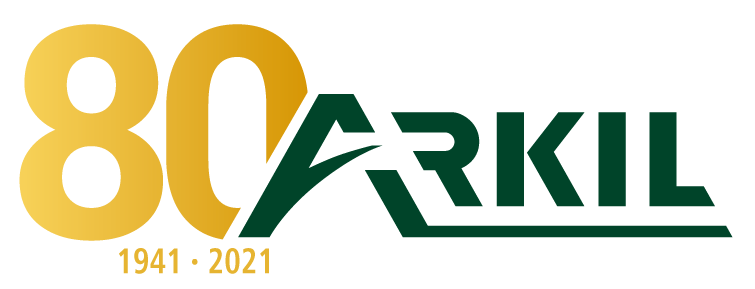History
1940
- CEOOve Arkil
- 1941 - Company founded
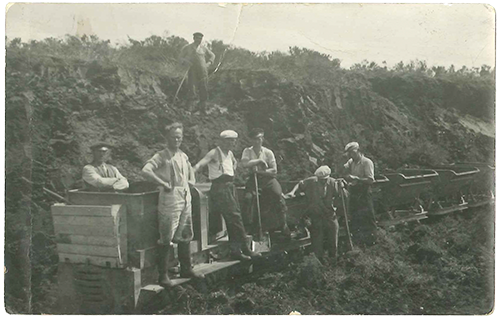
Forget everything you know about excavators and dump trucks – in the 1940s, construction work was done using shovels and tipper wagons.
Peat and more peat
In order to survive the particularly lean war years, Ove Arkil plunged himself into working in the Danish peat bogs. However, he got more into debt as the war continued and one afternoon in 1944 the war came knocking at his door. Outside the basement office that Ove had set up under his family's home stood two German soldiers. They told Ove that they wanted him to manage the expansion of a military air base in the town of Skrydstrup. His reply was one that he would remember for years to come: "You can, of course, come and put a gun to my chest and tell me that I must do it. If that's the case then I'll have to think of my family and decide what to do. But as long as you don't do that then I will refuse." The German soldiers eventually went on their way, as there were plenty of others who were willing to accept the job.
1950
- CEOOve Arkil
- 1951 - Skrydstrup Air Base
- 1955 - Fourth asphalt factory near Skive Harbour
- 1959 - Construction division established
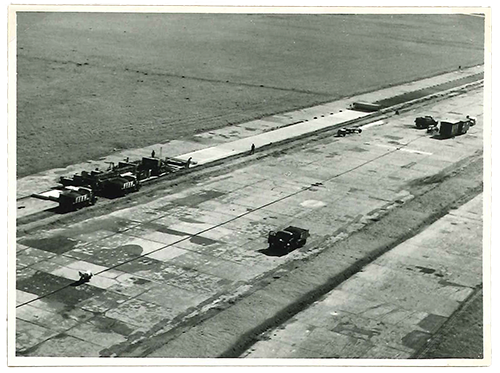
The expansion of Skrydstrup Air base was a huge project for Arkil's tiny construction company. All of the company's employees toiled around the clock to complete the project on time.
The important NO
The bank, on the other hand did not. The company had burned through its credit, and with it, the bank's patience. This meant that Ove would not have access to the 20,000 Danish kroner he needed to borrow to purchase equipment and materials, even though he was able to document that the company took in enough revenue and would be able to repay the bank. It was only when a local manufacturer put up collateral security that Ove was able to obtain the necessary funds. And so the adventure began!
Wind beneath the wings
The Skrydstrup project was only the beginning. The Danish Armed Forces desperately needed to expand the country's military air base installations, so that they would meet the requirements of the newly created NATO. After Skrydstrup, other large-scale expansion projects were put out to tender in the towns of Vandel, Karup, Tirstrup and Værløse. As Ove recalls, "The head of the Defence Construction Service apparently must have taken a liking to us, as he recommended us to those in charge to continue our work." Back then, projects were awarded to companies that had not collaborated with the occupying German forces, which meant Ove Arkil's 'no' in 1944 turned out to be the key to his company's success.
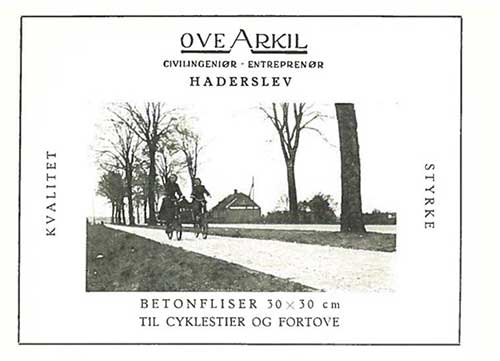
Advertisement from 1951. Concrete slabs were a new invention in the 1950s. Ove Arkil drove all the way from Denmark to the Netherlands to purrchase the casting machine. His 12-year-old son, Niels Ove, accompanied him on the trip.
1960
- CEOOve Arkil
- Number of employees35
- 1962 - New adress Åstrupvej 19
- 1963 - Rømø boatyard
The expansion proved to be a wise decision, as the asphalt production business boomed all the way through the 1960s and '70s.
Building boom
Back in Denmark, meanwhile, the 1960s was a decade of large-scale infrastructure and asphalt projects. At the same time, a construction boom had taken hold which, in many ways, was eerily reminiscent of the final months before the most recent financial crisis. It was at this time that many of the suburban townships where many of us have grown up were built – and for the first time, the modern single-family house was introduced in Denmark. Arkil was involved in the housing boom, as the company collaborated with local master builder H.C. Schleidt, and construction in general constituted a significant part of Arkil's activities throughout the 1960s and '70s.
From basement office to headquarters
The company would soon outgrow the basement office set up in the Arkils' private villa in Haderslev. And even though Ove had incorporated the stables behind the house in the 1950s, he finally had to admit that more space would be needed. In 1960, he purchased a villa located at Aastrupvej 19, and in 1970 he managed to also buy the neighbouring villa at Aastrupvej 17. The two villas would house Arkil's headquarters for the next 54 years.

Aastrupvej 17-19:In 1960, Ove Arkil purchased the villa at Aastrupvej 19 (right). In 1970, he purchased neighbouring Aastrupvej 17, and the two villas housed the companies headquarters for the next 54 years. In addition to his work with the construction company, Ove Arkil had served as the honorary French consul for Southern Jutland, which explains the French sign shown here.
An unlikely expansion
In the 1960s, there were plenty of opportunities to expand into types of projects other than the company's original construction and asphalt work. One of the more curious opportunities arose when Ove became involved in the construction and operation of a shipyard in Havneby Harbour, located on Rømø island. Unfortunately, shipbuilding was an activity outside of Ove's skill set, and his operating losses were soon made tangible. In his memoirs he wrote, "When the opportunity arose to sell off the shipyard, I was more than happy to say farewell to it."
1970
- CEONiels Arkil
- Number of employeesAbout 300
- RevenueApprox. 100 mill. Danish kr.
- 1974 - Second generation
- 1977 - Death of Ove Arkil
- 1978 - Arkil becomes listed company
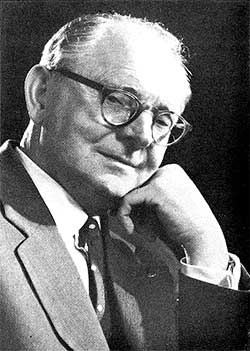
Civil engineer, consul Ove Arkil 1898-1977
Long stretches of motorway
Most of the Danish motorway network was built in the 1970s. Arkil was contracted to construct practically the entire Southern Jutland Motorway, which stretches from the German border in the south, all the way to the town of Kolding in the north. And even though the oil crisis presented a bump in the road, the company continued to grow at breakneck speed. As a result, there was a wealth of opportunities to be had, and it was only a matter of securing the necessary capital to take advantage of them.
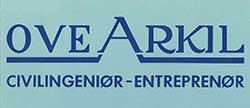
Logo 1966

Logo 1978
Listed on the stock exchange
In order to obtain this capital, in 1978 Arkil became the very first industrial company from Southern Jutland to be listed on the Copenhagen Stock Exchange. In doing so, the company's share capital increased from four to eight million Danish kroner, by selling one million A shares with tenfold voting rights and seven million convertible B shares. This meant that the family, though its full ownership of the A shares, could keep its voting majority in the company, while anyone could freely acquire B shares on the stock exchange. This is an arrangement that Arkil has maintained ever since. Arkil had attracted notoriety in the media in the months leading up to and after it went public. It was exciting for those involved to see whether there would be enough potential shareholders to raise the desired amount of capital. There were in the end, and the release of the company's first annual report resulted in a sharp increase in the share value.
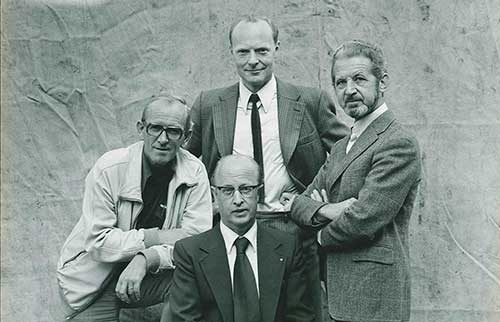
Executive Board, 1978: From left: Carl Forkert, Tage Sørensen, Niels Arkil og Folmer Hansen.
1980
- CEONiels Arkil
- Number of employeesAbout 550
- RevenueApprox. 350 mill. Danish kr.
- 1981 - Natural gas pipeline
- 1986 - Ove Arkil Espanã
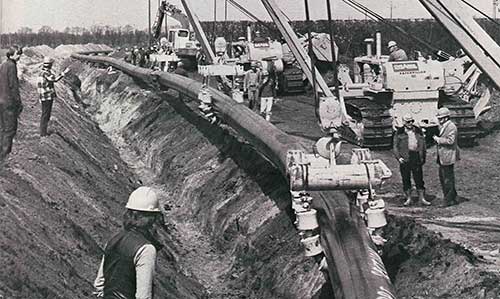
221 km natural gas pipeline
In the mid-1970s, CEO Niels Arkil was contacted by a French company, Entrepose, which specialised in building natural gas pipelines. Entrepose knew that the Danish government was preparing to put a project out to tender involving the construction of a primary natural gas pipeline that would span the entire length of the Jutland Peninsula. And now they were looking for a Danish business partner.
"It was a huge project for a company like ours at the time, and when Entrepose contacted us, my initial reaction was that there was no way we were up to the task," Niels Arkil recalls.
But the two companies stayed in contact, and at the end of the '70s, when Entrepose was awarded a major contract in France, Ove Arkil hired engineer Børge Jørgensen, who was assigned the task of specialising in precisely this type of project.
"We taught him French and sent him to France for six months so that he could learn from Entrepose. It was his job to pass on his knowledge to us when we visited him every three weeks," Niels recounts.
A valuable lesson
The lessons Børge learned proved valuable. In 1980, the newly formed joint company, Arkil-Entrepose, went to work and began constructing the 93 km natural gas pipeline, which stretched northwards from the German-Danish border to the town of Egtved. Perhaps not surprisingly, the fact that this small, unknown company was awarded the contract ahead of some of the biggest and most famous Danish consortia attracted little media attention.
The company was so successful in completing the project that, in 1985, it was contracted to construct the next stretch of the pipeline, which would run 128 km from Egtved to Viborg.
Even though the work demanded a great number of resources, in the 1980s Ove Arkil launched the wave of acquisitions that has essentially characterised the company ever since. In 1983, the companies Viborg Entreprenørbyg and B. Møller Gregersen became part of the Ove Arkil Group, which went on to acquire the Birkerød-based construction firm Brdr. Andersen in 1985, and then purchased shares in a related company, Brdr A & B Andersen in 1986.
In 1987, Arkil acquired the companies Clausen & Mikkelsen and Fyns Jordbor, which specialised in foundation projects. Eventually, these two acquisitions formed the basis of today's Arkil Fundering.
Enviromental expertise
In 1986, Ove Arkil was awarded its first large-scale environmental project, which was also the first of its kind in Denmark. The project, which involved decontaminating a chemical depot in the town of Skrydstrup, Denmark, was closely monitored by the media and government officials. It was an exciting new venture for the company, which had this to say about it in its annual report: "The project provided the company with valuable know-how, and we are now able to offer subcontracts, general contracts and full-line solutions to national, regional and municipal government agencies in this important field."
The environmental projects continued to come in to such an extent that, in 1988, Ove Arkil established a nationwide environmental division.
Viva España!
Spain finally escaped the grip of the Franco dictatorship in 1975, and the 1980s brought about a decade of heavy growth in the construction sector. The Costa del Sol region was the epicentre of the construction boom, as foreign tourists now had the chance to build and own homes there.

The Costa del Sol presented a wealth of opportunities, and Ove Arkil was not late to the party.
Ove Arkil was ready to take advantage of opportunities beyond the Danish border, and in 1986 the company established Ove Arkil España, which bought up land to construct buildings with Spanish style and Danish quality ‒ and the first 16 terraced houses built by the company were sold instantly. The flurry of building activity abated in the 1990s, and Ove Arkil España was closed at the end of the decade.
1990
- CEO, Arkil Holding A/SNiels Arkil
- CEO, Arkil A/SPer Kjærsgaard
- Number of employeesAbout 830
- RevenueApprox. 670 mill. Danish kr.
- 1991 - 50th anniversary
- 1998 - OASA founded
- 1999 - Inpipe Sweden AB
- 1993 - New CEO
From low growth to optimism
The many cable projects in the early '90s came during a period marked by relatively low growth and investment, as well as by the stringent financial policies implemented in Denmark in the 1980s that were intended to right the national economy. The days of heavy public procurement in the mid-1980s were over, and Arkil also had a debt to pay from that decade.
- "The big gas pipeline projects which were completed in the '80s sapped so many of our resources that we weren't sufficiently represented in other areas. So in the early '90s, we had to expend a great deal of time and effort to regain our secure foothold in the market," Niels Arkil recalls.
By the time the economy picked up again in the second half of the 1990s, Arkil had so successfully regained its foothold that, by the end of the decade, the company was able to boast double-digit growth rates.
The fall of the wall
Most people over 30 years old clearly remember where they were when, on 9 November 1989, the Berlin Wall came down. With one fell swoop, the chapter of the Cold War came to an end, and shortly thereafter Germany was reunified. However, the eastern half of the country was in a state of decay and in desperate need of heavy investment in its infrastructure.
Like so many times before, Arkil saw opportunity beyond Danish borders, and by 1990 the company established two subsidiaries in the former East Germany. The subsidiaries ‒ MAW Mecklenburger Asphaltmisch Werke GmbH and ASA-Bau GmbH ‒ were created to tap into the massive amounts of investments expected to be made in infrastructure.
Being among the first to venture into the former East Germany proved to be a wise decision. The two subsidiaries enjoyed solid earnings in the first half of the 1990s, though activity waned towards the end of the decade as other companies joined the fray and competition stiffened. By the close of the 1990s, the two subsidiaries merged to become ASA-Bau GmbH, which is still in operation today.
New CEO, New company
In 1993, Arkil A/S welcomed its first new CEO since 1977. This came about following a structural change in which the company was split up into Arkil Holding, which was listed on the Copenhagen Stock Exchange, and Arkil A/S, which managed the operations and was fully owned by Arkil Holding.
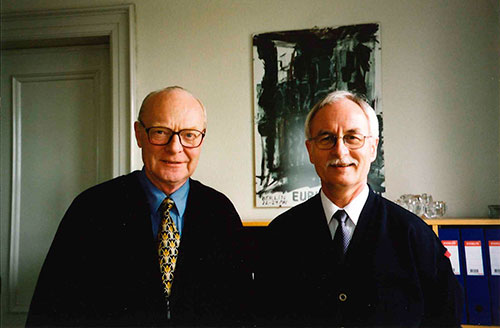
Per Kjærsgaard (right) was named CEO of Arkil A/S, while Niels Arkil (left) became the CEO of Arkil Holding.
Road maintenance as business opportunity
Arkil made history in 1998 when the company became the first private service provider in Denmark to assume responsibility for maintaining all of the country roads in Southern Jutland. The company to actually carry out the maintenance work was OASA, of which 49% was owned by the county, and 51% was owned by Arkil. It was such a big success that in 2004, when county governments were slated to be dismantled, Arkil assumed full ownership of the company and renamed it Arkil Vejservice (Road Maintenance).
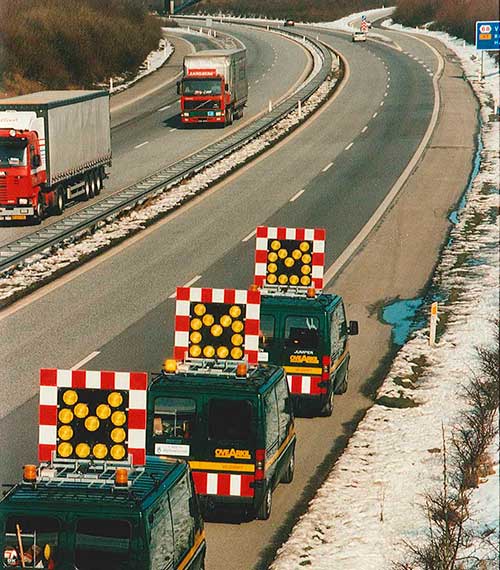
On the hunt for oil in the north sea
Even though Arkil continued to focus more on its core business of construction and infrastructure in the 1990s, there was still room for a couple of forays into completely different business areas. One such foray was an owner's share in the company Denerco, which was looking for oil deposits in the North Sea. There was not much at all to celebrate in the first few years, as the company continued to ask its shareholders for more money. But in the late 1990s, Denerco finally struck black gold, and it was later sold at a handsome profit.
2000
- CEOPer Kjærsgaard
- Number of employeesAbout 1.750
- RevenueApprox. 2.1 bill. Danish kr.
- 2001 - OAVA founded
- 2004 - Name and logo changed
- 2005 - Expansion into Eastern Denmark
- 2007 - Third generation

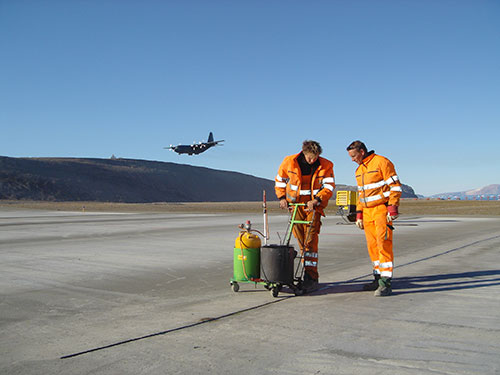
Asphalt project at Thule Airbase, Greenland
Third generation
In 2005, Arkil expanded eastwards into Denmark's Zealand Region by opening an asphalt factory in the town of Næstved, while all of the company's activities in the capital area were coordinated from a new regional office located just outside of Copenhagen. 2007 was the year when the third generation of the Arkil family assumed control of the company, as Jesper Arkil, son of Niels, became CEO. The same year, the company's total revenue surpassed the 2 billion kroner mark.
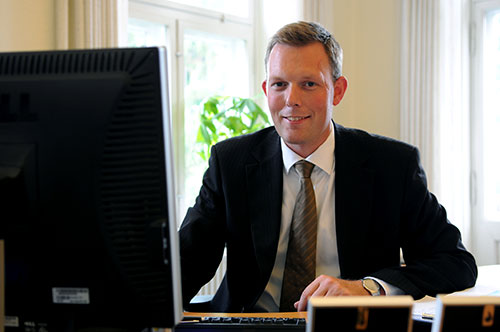
2007, Jesper Arkil
Growth via acquisitions
In 2008, Arkil Holding A/S acquired Colas Danmark A/S, and with it the company's construction, concrete and cable activities. The acquisition was part of the Group's strategy of strengthening and increasing its activities in construction and special infrastructure projects. In 2010, Arkil acquired the companies Arne Hansen A/S and Stürup A/S.
2010
- CEO, Arkil Holding A/SJesper Arkil
- Number of employeesAbout 1.800
- RevenueApprox. 3 bill. Danish kr.
- 2013 - Niels does not stand for reappointment
- 2015 - New adress Søndergård Alle
- 2016 - 75th anniversary
- 2019 - Delisting of the stock exchange
New headquarters
The company headquarters were moved from the old location in Haderslev to the new and modern surroundings at Søndergård Alle 4, near the Hammelev Motorway. The old office was put up for sale.
Also in 2015, Arkil A/S opened a new office in Odense, Denmark, in order to be closer to the large-scale infrastructure projects in and around the city that are expected to be launched in the coming years.
The Arkil Group will celebrate its 75th anniversary in 2016.
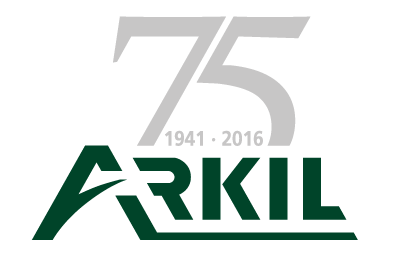
2020
- Chairman, Arkil Holding A/SJesper Arkil
- CEO, Arkil Holding A/SJens Skjøt-Arkil
- CEO, Arkil A/S Michael Hansen
- Number of employeesAbout 2.300
- RevenueApprox. 4.7 bill. Danish kr.
- 2021 - 80th anniversary
- 2022 - Jesper Arkil, Chairman of the Board
- 2023 - CEO, Michael Hansen Arkil A/S
In 2022, Agnete Raaschou-Nielsen handed over the chairmanship of the board to Jesper Arkil. Civil engineer Jens Skjøt-Arkil, son of Niels Arkil, joined the executive management of Arkil Holding A/S and Arkil A/S.
In 2023, Anders Blaavand and Thomas Fonnesbæk Boe joined the group management as Group CFO and Group COO, respectively, while Michael Hansen became CEO of Arkil A/S.
Arkil is one of Denmark’s largest construction companies, with approximately 2,300 employees and a turnover of around DKK 4.7 billion in Denmark and abroad.
Find department or contact person
